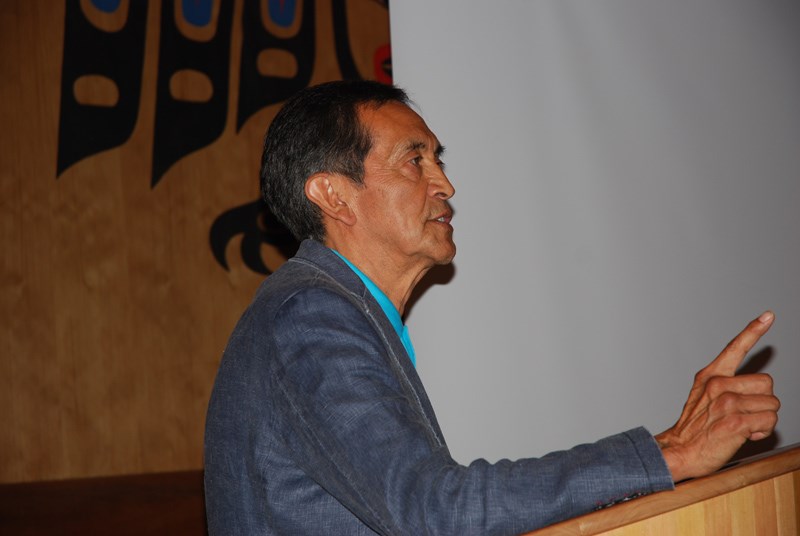The shíshálh (Sechelt) Nation has put senior governments on notice that it is assuming control over resource development within its territory, Chief Calvin Craigan said Friday, July 25, during a historic gathering at the Band longhouse.
Addressing leaders from Squamish and Sliammon First Nations and elected local government officials, Craigan said the Sechelt Nation is not going to wait for a court to acknowledge the Band’s jurisdiction and ownership over its land and resources.
“We will assert our right to overcome the provincial jurisdiction,” Craigan said. “The province will have no more say in how they run our land, how they manage our resources. They will have no more say in the foreshore, they will have no more say in the water rights, they will have no more say in how forest tenures are handed out. We have put them on notice.
“We are telling them that we are taking control, we are taking our rightful place to govern the resources within our territory.”
Craigan said the process had started the day before and ministers in both the provincial and federal governments had been put on notice.
While the Band’s position follows the Supreme Court of Canada’s landmark Tsilhqot’in (Chilcotin) decision on Aboriginal title in late June, Craigan said Sechelt had given the province “the right to come to our territory to negotiate new ways, new relationships, yet we’ve been denied.”
At a meeting the week before with provincial deputy ministers, he said, an offer was made to the Band to exchange lands for key areas that had been infringed on and whose value was “undeterminable” to the Band.
The province “clearly stated” that there was no money to put on the table, “yet they turn around and insult us and said they would give us tenure on land in our territory … on land that we already own,” he said.
“So we’ve given them the opportunity, we’ve given them the chance in good faith to come forward to deal with us, government to government. But they minimize what our rights are, minimize our jurisdiction … They’ve backed out and insulted us.”
Self-governing since 1986, Sechelt Nation leaders “know that our position is very strong, that probably Haida Gwaii is the only Band ahead of us that will receive a settlement,” Craigan said.
“But we’re not waiting for that day for the courts to say and acknowledge that we too have jurisdiction and ownership of our land and resources.”
Craigan led his remarks by hailing the Tsilhqot’in decision, which for the first time affirmed Aboriginal title to unceded traditional territory.
“We’ve been looking forward to the decision for many, many decades. We started this process when we were young men,” said the 70-year-old chief.
Sechelt Nation rights and title director Jasmine Paul outlined key provisions of the ruling, which said consent must be obtained from Aboriginal title-holders before land uses are approved, placing the legal burden on the Crown to show “a compelling and substantial legislative objective” and satisfy other conditions when consent is not given.
“New consent-based decision-making processes will be developed between parties,” Paul said, describing the change as transformative. “Changes in attitude, mindset, structure, policy, process and law will all be required.”
Asked to respond to Craigan’s statements, B.C. Aboriginal Relations and Reconciliation Minister John Rustad confined most of his comments to the issue of the Pender Harbour foreshore, which had been cited as a prime example at the forum of the province’s unwillingness to negotiate in good faith with the Sechelt.
“B.C. has met with the Sechelt Indian Band to discuss a negotiating framework for a resolution to the long-standing issue of dock management in Pender Harbour,” Rustad said in an email Tuesday. “This includes provision to complete the draft dock management plan, developed jointly by the Sechelt Indian Band and the province. As well, the province will engage with the public on that dock management plan, and review the results of the public consultation with the Sechelt Band.”
Rustad concluded: “B.C. is committed to working with the Sechelt Indian Band to create a climate that will stimulate investment, create jobs and provide economic benefits for the Band and for all British Columbians.”



